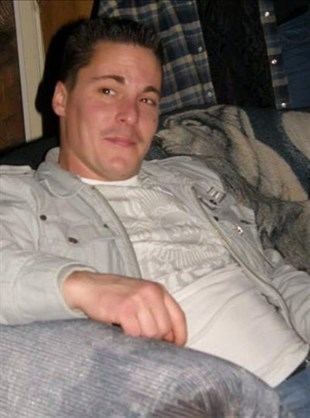
Steven J. Scott died in a cell at the Penticton RCMP detachment on Aug. 10, 2012 from complications due to alcohol withdrawal.
Image Credit: Candece Sabo
November 05, 2014 - 2:10 PM
PENTICTON - The need for more rehabilitation resources and police manpower were the running themes of this morning’s testimonies made during the coroner’s inquest on the death of Steven J. Scott who died in a cell at the Penticton RCMP detachment two years ago.
Patricia Gartner, a social worker at the Penticton Regional Hospital oversaw Scott during his hospital visit in March 2012. He tried to tell her he needed to get home to take care of his four-year-old daughter, but Gartner said he was so unstable he couldn’t even dial the phone.
She concluded he was in no state to care for a child and questioned whether he made the story up so he could go home and drink to numb the pain of alcohol withdrawal he was experiencing.
It was also clear that Scott was not ready to get help, such as detox or rehab, she said. Even if he was, the chance of there being resources available was slim.
There are only two detox facilities in the Interior that help alcoholics get past the physical dependence stage of withdrawal—one in Kelowna, another in Kamloops. Gartner said she has a hard time securing beds for people, such as Scott. Not only is there a lack of space, but many of the people who need these services don’t have the funding to transport themselves to a city with a detox facility, she said.
As a result, many hospital patients with substance abuse problems are discharged onto the street and the cycle begins all over, Gartner said. These people can’t go to homeless shelters most of the time because they are either full, or the person needs to be sober for 24 hours prior to entering, she said.
“If you‘re wanting to get into something government paid, there’s gonna be a wait,” she said. “I know that if I could just get them in,” there’d be a chance for them to get better.
And these resources are needed by people like Scott who have severe alcohol dependencies, but Penticton doesn’t offer that kind of help.
“To get over a substance abuse problem like this is substantial,” Gartner said of Scott’s condition before he died.
Lack of resources and manpower was also the theme in the evidence given by two Saanich police officers who conducted an external investigation of Scott’s death, as is required in cases when a person dies in police custody.
Sgt. Nancy Melville and Staff Sgt. Christopher Horstay and their team spent four days in Penticton investigating Scott’s death and the surrounding circumstances. They found there were police records that documented Scott’s stint in the Intensive Care Unit in March, but these documents weren’t reviewed when he was arrested in August. If they were reviewed by the arresting officer, any information of Scott’s health was not passed on to officers at the station.
Melville reviewed and compared video footage with the log book and found “drastic discrepancies” in the physical checks that should be done every 15 minutes. She said there were only four logged checks (when the guard looks into each cell to ensure the prisoner is safe) when there should have been 48 in the selected time period.
New local policy includes amendments to logging physical checks, but Melville and Horstay also suggested having two guards working the cells. They also said it would be ideal to have a watch commander who is required to stay at the detachment and not be juggling duties like Cpl. Don Wigglesworth was the night Scott died. But more manpower costs money, which is a recurring issue, Horstay said.
But when it comes to medical needs there is only so much police officers can do, Horstay said. Police have to use discretion because a lot of prisoners make up stories to get out of the cells, and in this case, Wigglesworth believed Scott was lying, which he was at times, and in the end this went against him, he said.
The five-person jury will review the evidence Wednesday afternoon and make recommendations in front of Coroner Larry Marzinzik before the end of the day.
To contact the reporter for this story, email Meaghan Archer at marcher@infotelnews.ca or call 250-488-3065. To contact the editor, email mjones@infotelnews.ca or call 250-718-2724.
News from © iNFOnews, 2014